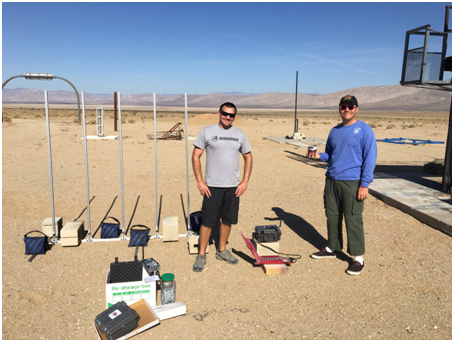by Chris Kobel and Larry Hoffing, Reaction Research Society
On Tuesday, July 19, 2022, 31 interns from various departments within Aerospace’s Engineering Division gathered in the Building D8 cafeteria to construct mid-power rocket kits. The kits were based on the LOC Precision company’s HyperLOC-160 model kits which utilize a 1.6” diameter airframe, plywood fins, and a 29mm motor mount, along with other requested custom modifications. Under the tutelage of Aerospace Corporation, Astrodynamics department retiree, Chris Kobel, along with his son James (both RRS members), VDID’s Isaac Goldner, Jeff Lang and his son Chase, and the Propulsion Science Department’s, Andrew Cortopassi (former RRS secretary and member), the interns successfully constructed the kits over a 2.5 hour period, while discussing various aspects of aerodynamics, propulsion, stability, recovery, and construction techniques. A second session was held the next day for three interns who couldn’t make the first session.
On Thursday, July 21, 2022, approximately 35 interns left Aerospace early in the morning on chartered buses and made the journey to RRS’s MTA facility in the Mojave Desert. They were accompanied by the Aerospace Corporation build team, along with VDID’s Jerry Fuller and Sophia Martinez as well as Carah Fukumoto from University Relations and Recruiting. The RRS treasurer, Larry Hoffing, acted as the Pyrotechnic Operator in charge for the event.
Under calm and clear skies, but with increasing temperatures reaching a high of 106 degrees Fahrenheit, approximately 45 flights were made, mostly successful. A new 5-rail launch pad provided by Aerospace Corporation was paired with the RRS MTA’s Cobra Wireless firing control system to handle the rocket flights. A few of the early flights indicated some slight instability which was addressed by adding ballast to the nose cones of the rockets (using desert sand!) moving the center of gravity (CG) forward to increase the margin of stability. The sight of some rockets were lost as they departed the launch wires in a somewhat sideways direction out over the desert or on a direct trajectory towards a blazing sun.

A demonstration flight of Aerospace’s C-LINK technology was marginally successful as the booster performed flawlessly, but the payload separated incorrectly and ended up powering into the ground.
Following the launch activities, the interns were treated to a terrific launch at the Voyager restaurant at the Mojave airport, welcoming the cool air-conditioning and ice cold drinks. Overall, it was a long and hot day, but a very successful outing with an enthusiastic response from the interns.
